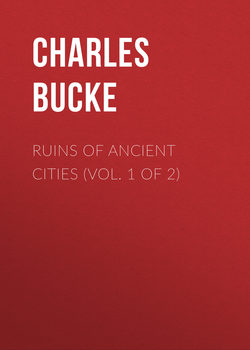Ruins of Ancient Cities (Vol. 1 of 2)

Реклама. ООО «ЛитРес», ИНН: 7719571260.
Оглавление
Charles Bucke. Ruins of Ancient Cities (Vol. 1 of 2)
PREFACE
NO. I. – ABYDOS
NO. II. – ABYDUS
NO. III. – ÆGESTA
NO. IV. – ÆGINA
NO. V. – AGRIGENTUM
NO. VI. – ALBA LONGA
NO. VII. – ALCANTARA
NO. VIII. – ALEXANDRIA
NO. IX. – AMISUS
NO. X. – ANTIOCH
NO. XI. – ARGOS
NO. XII. – ARIAMMENE
NO. XIII. – ARSINOE
NO. XIV. – ARTAXATA
NO. XV. – ARTEMITA
NO. XVI. – ATHENS
NO. XVII. – BABYLON
NO. XVIII. – BALBEC
NO. XIX. – BYZANTIUM
NO. XX. – CAIRO (OLD)
NO. XXI. – CANNÆ
NO. XXII. – CAPUA
NO. XXIII. – CARTHAGE
NO. XXIV. – CATANEA
NO. XXV. – CHALCEDON
NO. XXVI. – CHÆRONEA
NO. XXVII. – CORDUBA
NO. XXVIII. – CORCYRA. (CORFU.)
NO. XXIX. – CORINTH
NO. XXX. CTESIPHON
NO. XXXI. – DELPHOS
NO. XXXII. – ECBATANA
NO. XXXIII. – ELEUSIS
NO. XXXIV. – ELIS
NO. XXXV. – EPHESUS
NO. XXXVI. – GERASA. (DJERASH.)
NO. XXXVII. – GRANADA
NO. XXXVIII. – GNIDOS
NO. XXXIX. – HELIOPOLIS
NO. XL. – HERCULANEUM
NO. XXXVIII. – HIERAPOLIS
NO. XLII. – ISFAHAN
NO. XLIII. – ITALICA
NO. XLIV. – JERUSALEM
NO. XLV. – LACEDÆMON, OR SPARTA
NO. XLVI. – LAODICEA
NO. XLVII. – LEUCTRA
NO. XLVIII. – MAGNESIA
XLIX. – MANTINEA
NO. L. – MARATHON
NO. LI. – MEGALOPOLIS
NO. LII. – MEGARA
NO. LIII. – MEMPHIS
Отрывок из книги
The reader is requested to observe, that, though the plan of this work is entirely his own, the compiler of it does not put it forth as in any way original in respect to language or description. It is, in fact, a much better book, than if it had been what is strictly called original, (which, indeed, must have involved an utter impossibility:) for it is a selection of some of the best materials the British Museum could furnish; sometimes worked up in his own language; and sometimes – and, indeed, very frequently – in that of others: the compiler having, at an humble distance and with unequal steps, followed the plan which M. Rollin proposed to himself, when he composed his celebrated history of ancient times. – "To adorn and enrich my own," says that celebrated writer, "I will be so ingenuous as to confess, that I do not scruple, nor am ashamed, to rifle whereever I come; and that I often do not cite the authors from whom I transcribe, because of the liberty I take to make some slight alterations. I have made the best use in my power of the solid reflections that occur in the Bishop of Meaux's Universal History, which is one of the most beautiful and most useful books in our language. I have also received great assistance from the learned Dean Prideaux's 'Connexion of the Old and New Testament,' in which he has traced and cleared up, in an admirable manner, the particulars relating to ancient history. I shall take the same liberty with whatever comes in my way, that may suit my design, and contribute to its perfection. I am very sensible, that it is not so much for a person's reputation to make use of other men's labours, and that it is in a manner renouncing the name and quality of author. But I am not over-fond of that title, and shall be extremely well pleased, and think myself very happy, if I can but deserve the name of a good compiler; and supply my readers with a tolerable history, who will not be over-solicitous to inquire what hand it comes from, provided they are but pleased with it."
Having followed this example, – the compiler wishes he could say with equal effect, – he will be fully satisfied, should judicious readers feel inclined to concede, that he has shown some judgment in selecting his materials, and some taste in binding "the beads of the chain," that connects them together. He disclaims, in fact, (as, in the present instance, he is bound to do), all the "divine honours" of authorship; satisfied with those of a selecter, adapter, and compiler; and happy in the hope that he has here, by means of the superior writers, whose labours he has used, furnished his readers with an useful, accurate, and amusing work.
.....
The Gymnasia of Athens were many, but the most remarkable were the Lyceum, Academia, and Cynosarges. The Lyceum stood on the banks of the Ilissus; some say it was built by Pisistratus; others by Pericles; others by Lycurgus.
The Academy was so called from Academus. The Cynosarges was a place in the suburbs, not far from the Lyceum.
.....